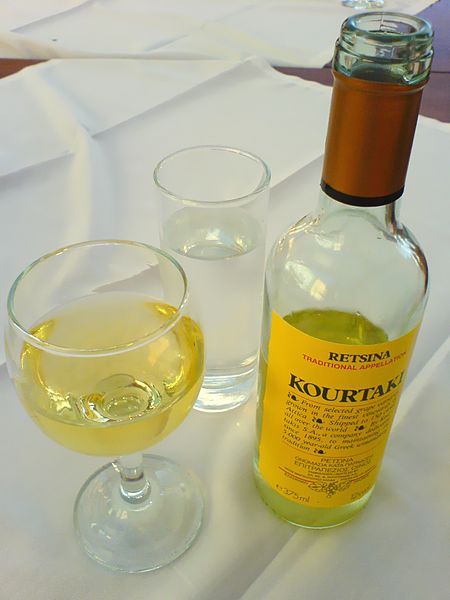.
Retsina (Ρετσίνα in Greek) is a Greek resinated white (or rosé) wine that has been made for at least 2700 years.

Retsina (*)
Its unique flavor is said to have originated from the practice of sealing wine vessels, particularly amphorae, with Aleppo Pine resin in ancient times. Before the invention of impermeable glass bottles, oxygen caused many wines to spoil within the year. Pine resin helped keep air out, while at the same time infusing the wine with resin aroma. In time the practice of adding resin to the fermenting must have flavored the wine even more strongly, and apparently kept it better preserved.
The Romans began to use barrels in the 3rd century AD, removing any enological necessity for resin, but the flavor itself was so popular that the style is still widespread today. It is perhaps the most commonly-drunk wine in Greece (though not equally popular in all its regions), and, given its strong flavor, is best served with the strongly herbed dishes characteristic of Greek cuisine and Mediterranean cuisine in general. Outside Greece, retsina is also produced in Cyprus.
Anecdotal history
Popular anecdotes about the evolution of retsina stem from the Roman conquest of Greece. Stories claim that the Romans plundered the lush white wines of Greece, angering the citizens who turned to pine resin as a way of extending their store of wine and as a deterrent to their thirsty conquerors. Basically the harsh flavor put off the Romans, who refused to drink the bitter ferment. This is most likely a bragging point about the ability of Greeks to drink the stuff without wincing, but a very humorous story neverthelesss.
An excess of undiluted retsina was said to be lethal.[1]
The Asteroid 2301 Retsina was named in honour of this wine after its discoverer spent some time in the Peloponnese .
Notes
- ^ "King Eric I of Denmark in 1102-3 and King Sigurd of Norway in 1107-10 went east as pilgrims as well as warriors ... fatally for the Norwegians, many of them dying from excess of undiluted retsina", Christopher Tyerman, God's War, 2006, p. 251.
See also
| Ancient Greece
Science, Technology , Medicine , Warfare, , Biographies , Life , Cities/Places/Maps , Arts , Literature , Philosophy ,Olympics, Mythology , History , Images Medieval Greece / Byzantine Empire Science, Technology, Arts, , Warfare , Literature, Biographies, Icons, History Modern Greece Cities, Islands, Regions, Fauna/Flora ,Biographies , History , Warfare, Science/Technology, Literature, Music , Arts , Film/Actors , Sport , Fashion --- |
Retrieved from "http://en.wikipedia.org/"
All text is available under the terms of the GNU Free Documentation License

